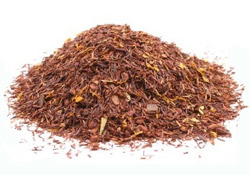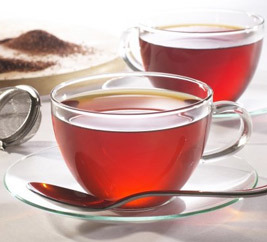While some of its health benefits may be exaggerated, rooibos tea is doubtlessly a great thirst quencher and an excellent beverage for everyone. | ||
Rooibos tea is as South African as boerewors or braai. Also known as redbush tea or red tea, rooibos has been popular in Southern Africa for generations. It is now enjoyed in many countries, especially as the awareness of its health benefits increases. There are no side effects associated with the use of rooibos tea. It does not contain caffeine, and its tannin levels are low compared to fully oxidized black tea or unoxidized green tea leaves, so it can be drunk freely. |  | Traditional and anecdotal medicinal uses of rooibos tea include:
|
Several researches conducted so far have confirmed that rooibos contains high level of antioxidants such as aspalathin and nothofagin and a number of phenolic compounds, including flavanols, flavones, flavanones, and dihydrochalcones, as well as flavonoids such as quercetin and luteolin. Some of the compounds found in rooibos have been linked with boosting the body’s natural defences, slowing the ageing process, preventing cancer and lowering the risk of heart disease. Though scientific studies are still limited, there have been several researches about the benefits of rooibos tea. One of them claims that drinking six cups a day promotes heart health. Others say that there are countless herbs and teas that have health benefits. According to them, rooibos can provide antioxidants and while it is certainly a healthy addition to one's consumption, it’s not a good idea to make exaggerated claims about it. In any case, whether it’s super-healthy or merely healthy, rooibos is doubtlessly a great thirst quencher and an excellent beverage for everyone, including children. |  | |
All the Ways to Enjoy a CuppaThere are no surprises from the health point of view: rooibos probably delivers most benefits when consumed without added sugar or milk. That having been dealt with, let’s discuss different ways to drink rooibos from the purely palate-pleasing point of view. Make a cuppa yourself, or order when you next go to a coffee shop (though the more outlandish variants are not available everywhere):
|  |